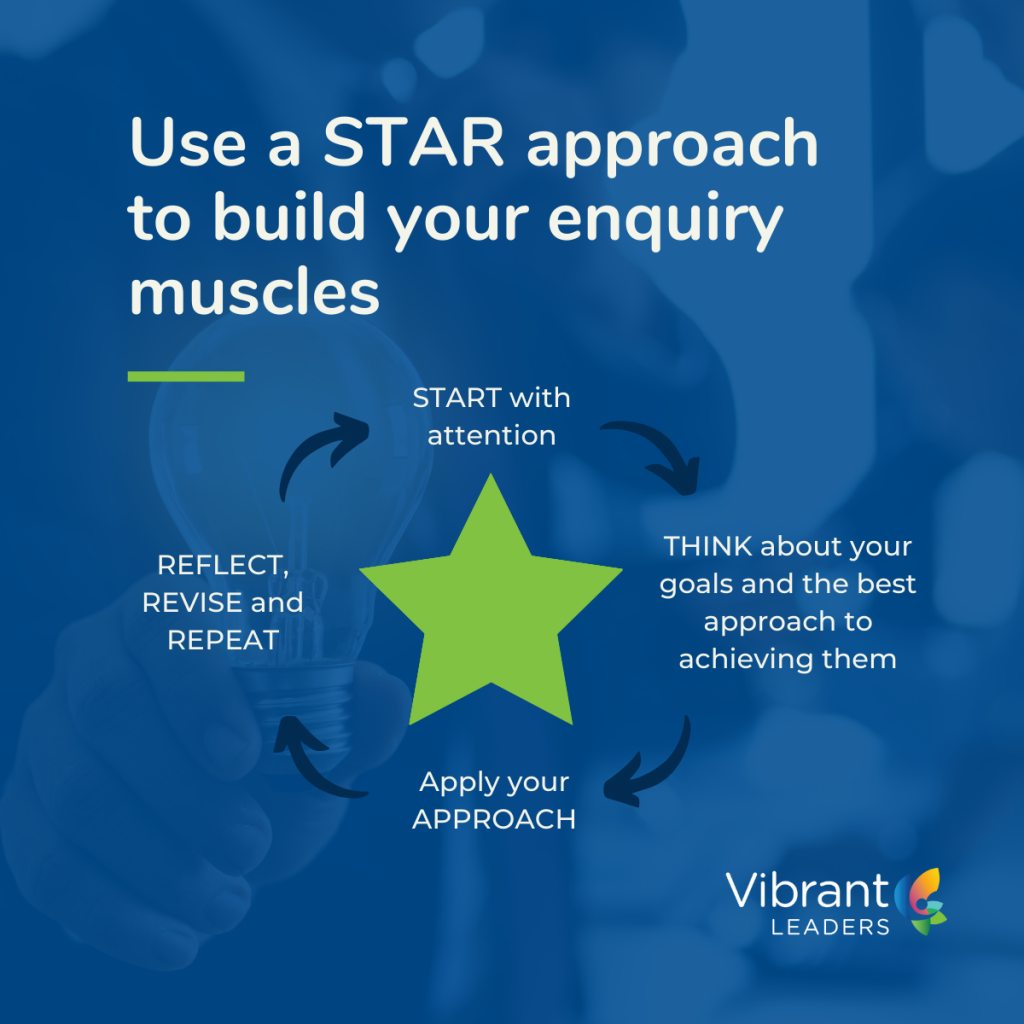Questions are an essential part of every leader’s toolkit. Why? Like an open door, questions can be an invitation to enter and explore. A powerful question can be just the opening everyone needs to get engaged and get the conversation flowing, whether it’s about a difficult topic, building the team, or exploring strategic options.
When used wisely and well, questions also invite people to share their ideas and points of view, even though they may see things quite differently. Which means it’s a crucial skill for leaders as they strive to foster more diverse and inclusive teams and organizations.
When you build and strengthen your enquiry skills, expect your leadership effectiveness to soar.
Why are questions so important for leaders?
Much like the act of opening a window to invite fresh air inside, questions hold the power to invite conversation, possibilities and more. Whether it’s for mentoring team members, problem-solving workshops, or 1:1 discussions about future direction, questions are a powerful starting point.
When leaders choose the right questions, they create the conditions for building awareness, understanding and relationships. Well-chosen questions also help explore fresh possibilities and strengthen collaborative problem-solving on complex, systemic issues.
Perhaps more importantly, when leaders offer questions rather than answers, they signal that the way forward is not carved in stone; in fact, alternative ideas are welcome. Questions also convey that the leader does not presume to have the best answer or the best solution. What a terrific way to build engagement, effectiveness, and performance while encouraging others to develop their critical thinking skills.
What is the purpose of your question?
Questions can play many roles, so it’s essential to be clear about how you intend to use them. For example, do you seek to listen, learn, and understand? Perhaps to encourage shared learning for all? Or are you focusing on ‘winning’ a debate or justifying a course of action?
It’s worthwhile asking yourself: how might others react and respond to each of those kinds of questions?
The role of questions often comes up in my coaching conversations with leaders, especially with leaders developing their team leadership skills. Those who come from strong technical roles in which they’ve been the ‘expert leader’ often struggle with letting go of being the expert. This mindset compromises their ability to empower the people they lead. By strengthening their questioning skills and resisting the urge to supply all the answers, these leaders encourage team problem-solving and skill development. They also free themselves up to spend more time leading versus doing.
The clearer you are at the outset about the purpose of your question, the more effective you (and your questions) will be.
What kind of question suits your purpose?
Because questions can be used either positively or negatively, it’s imperative that you clarify your purpose before you ask a question. For example, if you intend to use questions positively—perhaps to spark curiosity or dialogue—consider the kinds of questions that make this possible.
Questions that come from a place of curiosity invite and encourage others to contribute their ideas and perspectives. By opening dialogue and creating space for differing viewpoints, these questions often lead to better problem-solving.
Positive questions are rooted in curiosity and sound like this:
- “I know everyone is disappointed with our poor results; what can we learn from this experience?”
- “We’ve just been asked to meet an earlier deadline; what options can we consider as a team?”
On the flip side, questions that seek to confirm a pre-determined outcome or seem to come from a place of judgment or blame are negative.
I suspect you’ve heard these kinds of questions yourself:
- “Who’s responsible for these poor results?”
- “Your deadline’s just been moved up, so you’re going to need to work overtime; do I need to say anything else?”
Negative questions do not invite curiosity, openness or constructive dialogue and may encourage fear. They also suggest a closed mindset. As a result, decision-making suffers, and performance may be diminished.
Is your question powerful?
Questions hold power, especially when they come from leaders. However, some questions are more powerful than others. When you look closely at a question, you can see that the actual structure of the question may be the reason for its failure or success.
For example, a close-ended question like this may have little ability to invite or inspire:
- “Does anyone have a better idea?”
Typically, this kind of question leads to a yes or no answer, if not silence from all.
By comparison, an open-ended question like this one that starts with ‘what’ has a spaciousness that invites ideas and meaningful dialogue:
- “What possibilities might we consider in exploring another way forward?”
Questions that convey judgment or blame have the power to harm rather than empower. Here, the tone and intent behind your question speaks volumes, whether you realize it or not.
For example:
- “Why did you do that?”
When used well, ‘why’ can be the most powerful question of all. However, using ‘why’ at the start of any question can be an immediate negative trigger unless used wisely. You will want to treat it with great caution, especially if you are just starting out. For some solid examples of ‘why’ questions used well, check out this list from Mike Myatt.
As with any leadership skill, the art of using questions powerfully and well can be learned and practiced.
Use a STAR Approach to build your leadership ‘enquiry muscles’:

S: START with attention. Pay attention to how you typically communicate and interact with those around you. Do you tend to use questions? If so, how? What do you notice about the kinds of questions that work well? And those that land with a thud?
T: THINK about your goals and the best approach to achieving them. For example, if your purpose is to have a conversation that empowers a team to discover learnings from a project that didn’t go well, what kinds of questions will make it safe and inspire sharing? What types of questions should be avoided?
A: Apply your APPROACH. Feel free to start small and test your way forward, paying attention to the impact of each question. Resist the urge to answer your own questions and give others the time and encouragement to speak up. This is especially important if you’re just beginning to build your ‘enquiry muscles’ and working to empower others to learn and grow.
R: REFLECT, REVISE and REPEAT. Adopt an objective observer’s hat and ask yourself a few questions about your experience. For example, what worked/didn’t work? What can you do more of/less of next time? Remember, you’re learning a new skill. At the outset, it may feel awkward or uncomfortable. However, with time, practice, and a willingness to ask a few duds along the way, you’ll soon find yourself asking powerful questions each time.
Questions hold power, especially when they’re used by leaders.
When leaders are clear about their purpose and choose their questions wisely, questions can engage and invite conversation, learning, and so much more, leading to employee growth, better teamwork, and more effective decision-making.
As the skill of asking the right questions is essential for leadership effectiveness, it pays to build and strengthen your leadership ‘enquiry’ muscle. The good news? It’s a very learnable skill. Use the STAR approach I’ve outlined to get started and watch your leadership effectiveness soar.

